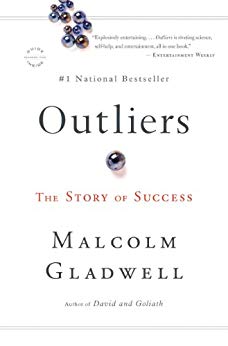

This article is an excerpt from the Shortform summary of "Outliers" by Malcolm Gladwell. Shortform has the world's best summaries of books you should be reading.
Like this article? Sign up for a free trial here .
What are some outlier examples? What stories illustrate that “self-made” success is a myth?
In Outliers, Malcolm Gladwell shows us that where you’re from and the opportunities you’re given matter as much as personal advantages such as talent and intelligence. He provides several outlier examples to illustrate his point.
Here are seven outlier examples that show how success really happens.
Outlier Examples That Help Us Understand Success
No one starts with nothing. Rags-to-riches stories fool us because although they may be factually true—you may start your life poor and finish it rich—they leave out all the advantages of circumstances that contribute to success. Further, they make us believe that success is an individual achievement. But no one succeeds alone. To follow are seven examples of outliers that help us understand success.
Outlier Example: The Town of Roseto
In 1961, when researchers first began their 50-year study of the health of the residents of Roseto, Pennsylvania, they had remarkably low levels of disease, crime, alcoholism, and suicide. In particular, the Italian-American community had low rates of heart disease.
Intrigued, the researchers talked to residents and combed death certificates looking for the leading cause of death in Roseto. What they found was shocking: There was no leading cause of death. People in Roseto were dying of old age.
Extensive research ruled out factors such as diet, exercise, genetics, and geographic region as the cause of the residents’ unusual degree of health.
Instead, researchers determined that their health stemmed from the protective effects of the town’s robust sense of community. Residents were active members of the church and civic associations. Their houses were close to each other and they visited each other throughout the day. Three generations often lived under the same roof and they respected their elders.
These findings created a paradigm shift in the way the researchers viewed health. Similarly, Outliers seeks to foster a paradigm shift in the way we understand success. Just as with health in Roseto, we can understand success in terms of the outlier’s environment rather than his individual attributes.
Outlier Example: Late-Winter Birthdays for Canadian Hockey Players
In any group of elite Canadian hockey players, 40% of players will have been born in January, February, or March. Is this a coincidence?
The cut-off date for playing hockey in a given age-class in Canada is January 1. This means that a child who was born on December 31, 2007, could play alongside somebody who was born on January 1, 2007, and is a full year older.
In childhood, a year makes a big difference. An extra year’s worth of growth and development means that players with January and February birthdays are likely significantly larger, stronger, and more coordinated than their November- and December-born peers.
Because these players are larger and stronger, coaches and scouts believe that they have the most natural talent, even when their skills are ordinary, relative to their age. Because people believed these players were more talented, they became more talented.
Outlier Example: Bill Joy
Bill Joy, the “Edison of the Internet” and cofounder of Sun Microsystems (one of the most important companies in Silicon Valley), first discovered computer programing at the University of Michigan. He went on to make several significant contributions to the world of computer science.
Joy had several extraordinary opportunities to develop his skills. These opportunities depended on timing and allowed him to accumulate hours of practice.
In 1971, the University of Michigan was one of the first universities to transition from a clumsy, time-consuming punch card computer system to a more efficient time share system. Joy says if he had been a little older and faced with dealing with the tedious punch card system, he would have abandoned computer science and studied biology.
Because of his birth year (1954), Joy was one of the first students at the university to use the new computer system. Students born after him missed the small window of time to write code for accessing the internet. Because of a bug in software designed to restrict students’ allotted computer time, Joy was able to hack the system and extend his hours of coding practice. The computer center was open 24 hours, allowing Joy unlimited access. He spent 8-10 hours a day programming.
Outlier Example: 2 Geniuses
Christopher Langan is the smartest man alive, with an IQ of 195 (for comparison, Einstein’s was 150). But he has spent most of his life as a bouncer in a bar.
Robert Oppenheimer was also a genius. The theoretical physicist and father of the atomic bomb was one of the most important figures of the 20th century.
Why are the career trajectories of these two geniuses so dramatically different? Money certainly played a role—Langan grew up in poverty and Oppenheimer’s family was well-off. But beyond the direct advantages of wealth, Oppenheimer benefitted from wealth’s indirect advantages, including being raised in the “concerted cultivation” style and learning the practical intelligence needed to talk his way out of numerous controversies.
Conversely, Langan was raised in the accomplishment-of-natural-growth parenting style. He never developed the practical intelligence that would have given him opportunities to succeed.
Outlier Example: Joe Flom
Joe Flom, the last living named partner of one of the largest and most powerful law firms in the world (Skadden, Arps, Slate, Meagher, and Flom), grew up in poverty in Brooklyn during the Depression. His parents were Jewish immigrants from Eastern Europe who worked in the garment industry.
In the 1940’s and 50’s, Jewish lawyers were excluded from elite firms. They accepted the litigation work that traditional white-shoe firms rejected. They also handled “proxy fights,” the legal side of a hostile takeover, when one investor or company tries to take over another company without its consent. Consequently, Jewish lawyers developed a unique skill set that would later become sought after. Flom’s specialty was proxy fights.
In the 1970’s, the tide changed. Corporate takeovers became more common. Suddenly, everyone needed litigation lawyers. For someone like Flom, the timing was perfect. He was one of the few experts in a sought-after specialization.
Because his generation was small, Flom’s opportunities were more numerous and the competition for jobs less fierce. Being born at a time when relatively few others were born was an advantage.
Flom’s parents were both garment workers. Working in the garment industry taught Jewish immigrants three components of meaningful work: autonomy, complexity, and the relationship between effort and reward. They brought these lessons home to their children, who used the lessons’ wisdom to help them become successful doctors and lawyers. Flom had an advantage over other first-generation Americans at the time. He learned the value of hard work by his parents’ example. Once again, beyond Flom’s innate abilities, the particular circumstances of his birth and environment had a huge impact on his ultimate outcome.
Outlier Example: Asians and Math
When it comes to math, the best students are the ones willing to spend a lot of time figuring out how to solve a problem. Asian kids demonstrate the most diligence.It seems that Asian kids are good at math because of their diligence. Where does this diligence come from?
Diligence may stem from a legacy of rice farming. Rice farming requires extraordinary precision and skill.
- Western farming is “mechanically oriented,” meaning that expansion requires larger plots of land and bigger and better equipment.
- Eastern farming, on the other hand, is “skill oriented.” Historically, rice farmers possessed neither the money for big plots and fancy equipment nor the space. They depended on their skills and long, hard hours.
Rice farming is difficult work. The annual workload for a rice farmer consumes about three thousand hours per year (that’s more than eight hours of work per day, every single day, all year). Rice farming requires extreme diligence.
Even if their families no longer work in the rice paddies, Asian kids inherit the cultural legacy of diligence, and this shows up most prominently in their math abilities.
Outlier Example: KIPP Academy
KIPP Academy in the South Bronx is an experimental, public middle school with an astonishing track record. It produces many, many outliers in low-income, underserved communities by creating opportunities for success.
What is the secret to KIPP’s success? More time. Students attend school for longer periods of time both over the course of a day and over the course of the school year.
The KIPP school year extends into summer, and all students attend school from 7:45 am to 5:00 pm. Many students participate in extracurricular activities until 7:00 pm. This works out to a school day that contains 50-60% more learning time than a day at a traditional public school.
Extended time for learning allows for a more relaxed atmosphere in which students can question and struggle their way through problems at their own pace. Opportunities like this make school work meaningful.
Continuing school into the summer break enables students from poorer families to continue to learn rather than fall behind their wealthier peers. By extending learning time (and therefore opportunities), KIPP fights back against the cultural legacy that tells us that rest is more important to our ultimate success than diligence.
These various outlier examples help us understand the true foundation for success.
———End of Preview———

Like what you just read? Read the rest of the world's best summary of "Outliers" at Shortform . Learn the book's critical concepts in 20 minutes or less .
Here's what you'll find in our full Outliers summary :
- What makes some people outliers, and most others not
- Why some genius outliers end up failing in life
- Why Asians are good at math, and other curiosities of culture






